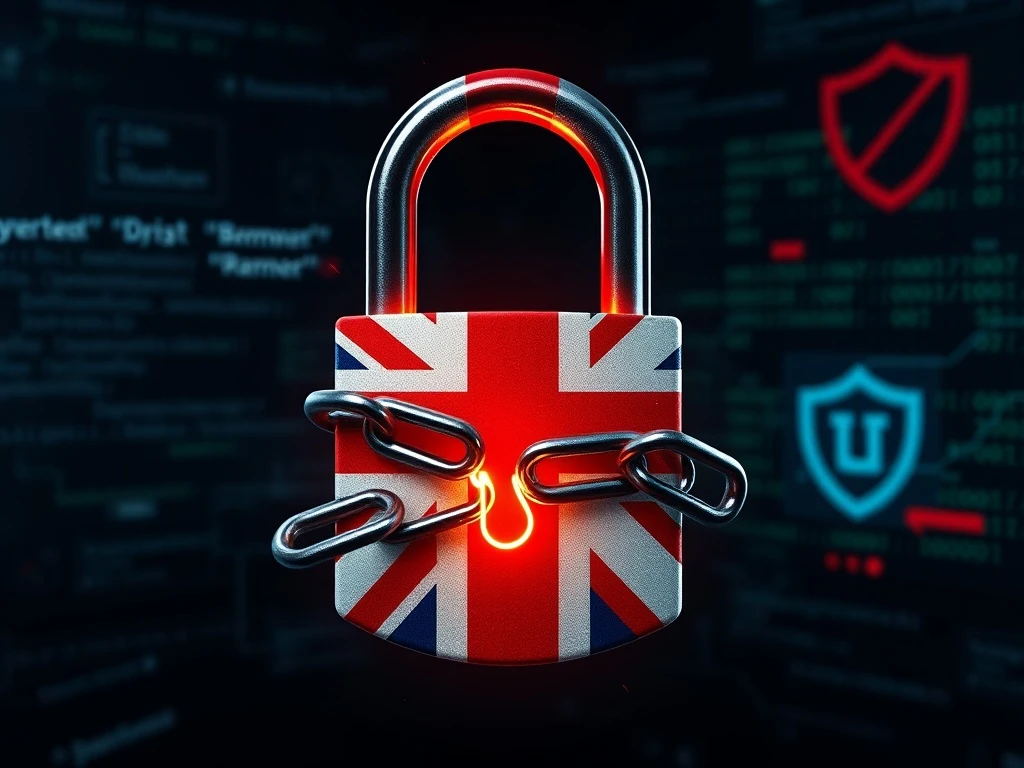Ransomware Ban UK: Decisive Move to Cripple Cybercrime in Public Sector

The digital battlefield just got a critical new front. In a bold move designed to safeguard essential services and dismantle illicit operations, the UK government is poised to implement a sweeping ransomware ban UK-wide for its public sector. This isn’t just about preventing financial payouts; it’s a strategic blow aimed squarely at the very foundation of cyber criminal profitability, with significant implications for how digital extortion is combated globally.
Why a Public Sector Ransomware Ban UK-Wide is Imperative
The UK government is taking a firm stance against cyber extortionists by prohibiting its public sector bodies, including the National Health Service (NHS) and local councils, from making ransomware payments. This decisive action is a direct attempt to “smash the cyber criminal business model,” which often relies on the promise of quick, untraceable payouts—frequently demanded in cryptocurrency.
The proposals, which emerged from a public consultation, aim to expand an existing ban on government departments to cover all public sector bodies and critical national infrastructure, such as energy, health services, and local councils. This comprehensive approach is designed to:
- Protect Vital Services: Ensure essential public services remain operational and resilient against disruptive attacks.
- Deter Criminals: Remove the financial incentive for cybercriminals targeting UK public infrastructure.
- Enhance National Security: Strengthen the UK’s overall digital defenses and reduce vulnerability to state-sponsored or organized cybercrime.
Security Minister Dan Jarvis affirmed the Home Office’s determination to disrupt these criminal enterprises and work closely with industry to advance these crucial measures.
Understanding the New UK Cybersecurity Policy and Reporting
Beyond the outright ban, the proposed UK cybersecurity policy includes a multi-faceted approach to bolster defenses and gather vital intelligence. Key elements of the new framework include:
- Expanded Payment Ban: A legal prohibition on ransomware payments for all public sector entities and critical national infrastructure operators.
- Prevention Regime: A requirement for victims and businesses not covered by the direct ban to report when they intend to pay a ransom. This aims to provide authorities with valuable insights into the broader ransomware landscape.
- Mandatory Threshold-Based Reporting: A system requiring victims to submit an initial report with key details to the government within 72 hours of an attack, followed by a more in-depth analysis within 28 days. This standardized reporting is crucial for understanding attack vectors and improving response strategies.
This structured reporting system is a significant shift from the previous voluntary approach, promising a clearer picture of the threats faced and enabling a more coordinated national response.
The Impact on Cryptocurrency Ransomware Payments
Ransomware, by its very nature, often leverages cryptocurrency for its demands, given the perceived anonymity and ease of cross-border transactions. This ban directly targets the flow of funds, specifically aiming to cut off a significant revenue stream for cybercriminals from the UK’s public purse. While Chainalysis reported a 35% decrease in ransomware attacks last year compared to 2023, the threat remains potent, and the prevalence of cryptocurrency ransomware payments continues to be a concern for law enforcement globally.
It’s important to note that while ransomware attacks saw a decline, other forms of crypto-related losses, such as wallet compromises and phishing attacks, remained significant, as highlighted by CertiK’s reports. The UK’s ban aims to reduce one specific avenue of financial gain for criminals, pushing them away from targeting critical public services.
Navigating Cybercrime Prevention: Public Sentiment and Global Context
The Home Office’s consultation on these proposals, which garnered 273 responses, revealed broad support for a targeted ban on ransomware payments, with nearly three-quarters of respondents agreeing on its necessity. However, there were mixed views on the prevention regime and, notably, on the nature of penalties for those who might violate the measures. Concerns were raised about potentially criminalizing victims, leading the Home Office to continue exploring the most appropriate and proportionate penalties.
The urgency of enhanced cybercrime prevention is underscored by recent incidents. The UK’s 2024 National Cyber Security Centre’s Annual Review identified ransomware as the “most immediate and disruptive threat.” Recent examples include a June 2024 attack on pathology laboratory Synnovis, which delayed medical procedures, and an October 2023 attack that compromised the British Library’s online systems, severely impacting access to its vast collection.
Internationally, approaches vary. While the UK moves towards a ban, US House Republicans have sought to cut funding for enforcing a rule requiring public companies to disclose cyber incidents within four days. In contrast, Australia, after considering a ban, enacted laws in May requiring businesses and critical infrastructure operators to report ransomware demands, signaling a global shift towards mandatory reporting and greater accountability in the face of public sector ransomware threats.
A Strong Stand Against Digital Extortion
The UK cybersecurity policy marks a significant escalation in the fight against digital extortion. By cutting off the financial lifeline for criminals from its public services, the UK aims to set a precedent and significantly disrupt the cyber criminal business model. While challenges remain, particularly around defining appropriate penalties and fostering global cooperation, this decisive action signals a strong commitment to cybercrime prevention and protecting national infrastructure from the pervasive threat of ransomware attacks. This initiative underscores a growing global consensus that a more proactive and punitive approach is needed to truly dismantle the cyber criminal ecosystem and safeguard our digital future.









